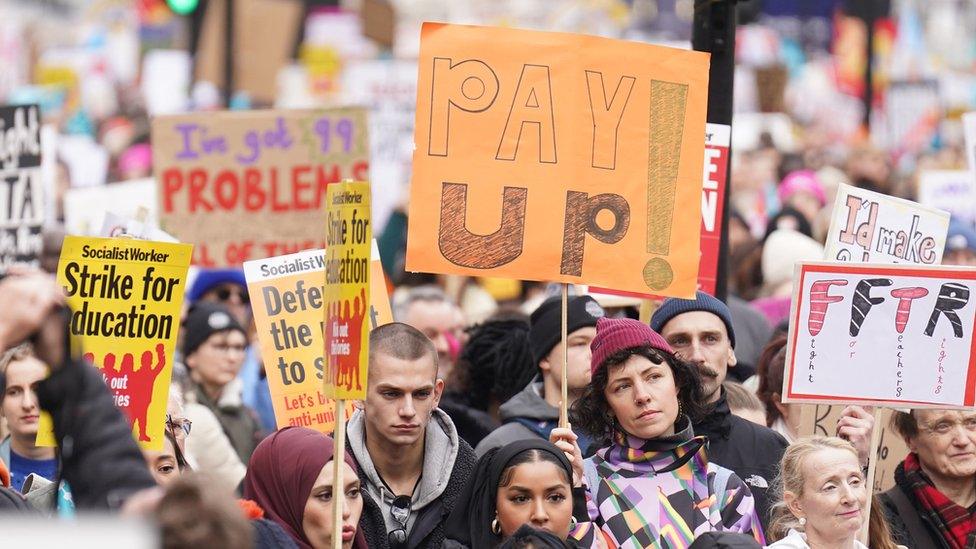Public sector pay: Workers offered pay rises of around 6%
- Published

Hundreds of thousands of public sector workers have been taking part in strikes over pay
More than one million public sector workers, including teachers, police and doctors, have been offered pay rises of between 5%-7%, the government says.
Under the proposals, police and prison officers in England and Wales would receive a 7% pay rise, while teachers and junior doctors in England would get 6.5% and 6% respectively.
Four education unions said the deal would allow them to end their dispute.
They said they would advise their members to accept the offer.
Asked how he would pay for increases, Rishi Sunak said it would "mean choices - I'm not shying away from that".
"It's not about cuts, it's just about focusing on public sector workers' pay rather than other things," he added, insisting changes could be made "without impacting frontline service delivery".
He also said the government would raise over £1bn by "significantly" increasing charges for migrants coming to the UK when they apply for visas and the levy they pay to access the NHS.
Pay increases for teachers and the police will come in from September this year, while rises for others - including doctors, dentists and police - will be backdated to April.
The salaries of NHS staff in England - apart from junior doctors and dentists - are not included in these recommendations.
Under a deal set out earlier this year, NHS workers will receive a 5% pay rise. Ambulance workers, nurses, physiotherapists and porters will also get a one-off sum of at least £1,655.

What pay rises have been offered and how have the unions reacted?
Teachers (England) 6.5%: Because schools will not have to fund pay rises from existing budgets, teaching unions are generally happy and even issued a joint statement with the government saying the offer recognises how vital teachers are.
Junior doctors (England) 6% + £1,250 consolidated increase: This is probably the least happy group. Unions say the 6% offered marks another real-terms pay cut and does not address years of below-inflation pay. It criticised the government for not negotiating, as did happen with doctors with Scotland. The unions are also unhappy as the government has not promised extra money to fund the rise so departments will have to make savings, raising fears of cuts. The junior doctors' strikes will continue.
Consultants, dentists and GPs (England) 6%: The British Dental Association says the below-inflation awards will "undermine efforts to bring NHS dentistry back from the brink".
Police officers (England & Wales) 7%: The Police Federation of England and Wales says officers will have mixed feelings - because it is not as bad as rumoured, but it does not fully address the challenge of rising prices.
Prison officers (England & Wales) 7% and more for support grades: The POA union - which represents prison workers and, like the police, does not have the right to strike - gave its initial reaction on Twitter, saying in real terms it was another pay cut, but that it will scrutinise the deal further.
Armed forces (UK) 5% + £1,000 consolidated increase: Armed Forces personnel are not allowed to be members of a trade union. Their professional association, the British Armed Forces Federation, said that while their members did not have a right to strike, they were "voting with their feet" by leaving the services.
Senior civil servants 5.5%: The FDA union called the offer "fair and reasonable", but Prospect said: "The government has not allocated extra money to pay for it."

The prime minister ruled out funding the increases through extra borrowing or increasing taxes.
Mr Sunak said pay awards in the education department would be fully funded, but did not set out how this would be achieved.
Schools minister Nick Gibb promised there would be no cuts in "front-line services" in schools or colleges.
Rising prices have prompted industrial action across much of the public sector, with workers calling for pay rises matching or exceeding the rate of inflation which currently stands at 8.7%.
But with the education unions welcoming the government's offer, parents and pupils could see an end to strikes which have impacted schools across England over the past year.
On Thursday, junior doctors in England began a five day walkout, after their calls for a 35% pay increase were rejected.
The government has been resistant to offering above-inflation pay rises warning it would further fuel inflation.
Responding to Mr Sunak's announcement, Unite general secretary Sharon Graham said: "By accepting the pay review body recommendations and then not funding them the government is putting its departments between a rock and hard place - they now have to choose between paying workers a half-decent salary or cutting services in already underfunded public services."
TUC general secretary Paul Nowak said union members would take "comfort" from the fact that the prime minister had accepted the pay review bodies' recommendations.
"The question will be - is he able to deliver pay rises in a way that won't have a negative impact on services. Our members will have a long look at that - they won't want to see Peter robbed to pay Paul.
Mr Sunak said his offer was "final" and further industrial action would not change that decision, stressing: "There will be no more talks on pay. We will not negotiate again on this year's settlements and no amount of strikes will change our decision."
Speaking at the Unite union's policy conference in Brighton, Labour leader Sir Keir Starmer said the pay offers would be "subject to negotiation" and he would "not wade into that".
He said there was no "magic wand that could wave away the need for economic stability", but added: "If Labour can not break the suffocating hold of low wages we will have failed."
Visa application fees and the immigration health surcharge are going up "significantly" to raise money, Rishi Sunak says.

What are pay review bodies?
Almost half of public sector workers are covered by pay review bodies, including police and prison officers, the armed forces, doctors, dentists and teachers.
The pay review bodies are made up of economists and experts in human resources, with experience in both the public and private sector, and are appointed by the relevant government department.
Their recommendations are not legally binding, meaning the government can choose to reject or partially ignore the advice, but it is usually accepted.

What do you think about the Prime Minister's announcement on public sector pay? You can share your experiences by emailing haveyoursay@bbc.co.uk, external.
Please include a contact number if you are willing to speak to a BBC journalist. You can also get in touch in the following ways:
WhatsApp: +44 7756 165803
Tweet: @BBC_HaveYourSay, external
Please read our terms & conditions and privacy policy
If you are reading this page and can't see the form you will need to visit the mobile version of the BBC website to submit your question or comment or you can email us at HaveYourSay@bbc.co.uk, external. Please include your name, age and location with any submission.
Related topics
- Published11 July 2023

- Published15 April

